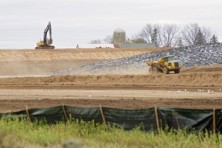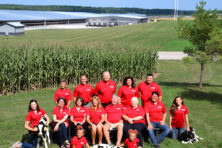DNR Overrides Judge’s Orders on Kinnard Farms Permit
- Share
- Tweet
- Pin
- Share
The Wisconsin Department of Natural Resources announced on Sept. 11 that it is unable to comply with two orders that were handed down last October by Administrative Law Judge Jeffrey Boldt in the matter of a pollution discharge permit for Kinnard Farms in Kewaunee County.
In granting a petition filed by Kinnard Farms for the modification of the farm’s Wisconsin Pollutant Discharge Elimination System permit, DNR Secretary Cathy Stepp said in a statement that the agency would not comply with Judge Boldt’s order to set a maximum number of cows the farm can have and that it would not require the farm to set up an offsite groundwater monitoring system.
“We realize areas in the northeastern part of the state are experiencing some water quality challenges and we at the DNR are doing what is within the confines of current law to address the situation,” Stepp said. “In regards to the Administrative Law Judge’s findings concerning Kinnard Farms in Kewaunee County, we have approved an onsite groundwater monitoring plan in granting this petition along with strengthened liquid waste storage plans and production area discharge limitations as outlined in the judge’s findings. However, the state Department of Justice has clarified that we cannot legally set a maximum number of animal units for Kinnard Farms or require an offsite groundwater monitoring system. As advised by DOJ, it would be a violation of state law.”
“We are pleased DNR Secretary Cathy Stepp followed the Department of Justice’s advice and refused to impose these unlawful conditions on our farm permit,” said Lee Kinnard, co-owner of Kinnard Farms, in a separate press release. “It is the right result under the law. This is a complete vindication of our legal position and a victory for Wisconsin’s farmers.”
Lynn Utesch, a Kewaunee County farmer and co-founder of Kewaunee Cares, had a different take on the announcement.
“Secretary Cathy Stepp has full authority to properly address the water quality and contamination issues that plague Kewaunee County,” he said. “Unfortunately Secretary Stepp minimizes our water and health emergency crisis here, remarking that, she and the DNR ‘realize areas in the northeastern part of the state are experiencing some water quality challenges.’
“It is tragic that Town of Lincoln residents will not be safeguarded by the provisions put forth in Judge Jeffery Boldt’s decision regarding the Kinnard CAFO operation,” Utesch continued. “The changes Secretary Stepp references regarding the DOJ and our state legislature must be addressed by Stepp and the DNR. Common sense animal unit cap limits in this karst region and groundwater monitoring are reasonable requests made by Judge Boldt, who described the conditions in the Town of Lincoln as ‘deplorable,’ resulting from ‘massive regulatory failure.’ Secretary Stepp’s inabilities seem to stem from lack of political will, not power. Stepp should be petitioning both the legislature and DOJ for the changes necessary to protect the health and safeguard citizens, and our water, as found in the Public Trust Doctrine. Wisconsin’s current ‘open for business’ climate and DNR support of the CAFO industry continue to impoverish rural communities throughout Wisconsin and the nation.”
Midwest Environmental Advocates (MEA), which represented the five Kewaunee County petitioners in the Kinnard case, said the petitioners will review options for appeal.
MEA attorneys contend the DNR and DOJ are playing legal games at the expense of Kewaunee County residents.
“At the heart of the DNR action and supporting opinions from the Wisconsin Department of Justice is a dispute regarding the DNR’s power to require the company to impose animal limits or groundwater monitoring,” the MEA said in a statement. “According to the DOJ, because terms such as ‘animal unit limit’ or ‘offsite landspreading’ do not appear in state water pollution statutes verbatim, the DNR doesn’t have the authority to require these kinds of limits or monitoring in industrial livestock operations’ pollution permits. Yet the DNR is clearly required in state statutes to impose maximums on pollution discharges (in this case, manure spreading) or limit the sources of pollution (in this case, cows) when necessary to comply with basic federal and state laws intended to protect our state’s water quality.”
“We disagree with the opinion of the DOJ on the authority of the DNR in using reasonable strategies to regulate industrial livestock operations’ waste,” said attorney MEA Sarah Geers. “The DNR narrowly interprets state statutes in matters of the public’s welfare and interests in keeping our water resources clean. Yet the DNR broadly exercises its authority and disregards court decisions when it is in the interests of industry. This is not a legal problem. It is a problem of the influence of politics and industry over the execution of laws that protect the public from unmonitored and unlimited pollution in our water.”



